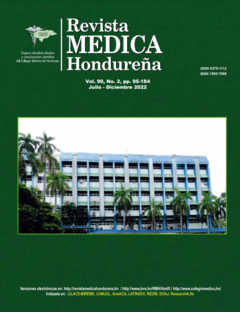High prevalence of intellectual and behavioral disability in children aged 2-17 years, Honduras 2017
DOI:
https://doi.org/10.5377/rmh.v90i2.15330Keywords:
Disabled children, Disability evaluation, Honduras, Intellectual disability, Problem behaviorAbstract
Background: In Honduras the last record of disability in children was in 2002 and it is considered that its value may have been underestimated. Objective: To determine the prevalence of disability in children aged 2-17 years, Honduras 2017. Methods: Cross-sectional descriptive study. Students of the last year of the Medicine Career, Universidad Nacional Autónoma de Honduras (UNAH), visited 50 houses in the assigned communities through multistage sampling. Adult caregivers of children aged 2-17 years were surveyed using the Washington Group Instrument, with prior informed consent/assent. Univariate analysis (frequencies, percentages, prevalence, 95%CI) and bivariate analysis (difference of proportions, p<0.05 was considered significant) were performed. Results: Prevalence of disability in children was 8.96% (95%CI 8.5-9.4), departments with prevalence ≥10%: El Paraíso, Francisco Morazán, Santa Bárbara, Cortés and Comayagua. Higher prevalence was identified in males, age 5-17 years, middle and high school level and inverse relationship between disability and caregiver’s schooling and household income level (p<0.01). The type of disability found was intellectual and behavioral: behavior (1.9%) and communication (2.4%) in age 2-4 years, and behavior, learning, attention and communication in age 5-17 years (prevalence≥2%). Eighty percent had not received any care. Discussion: Disability in Honduran children is higher than reported, and these children are neglected and may be dependent adults in the future. Early childhood caregivers should be educated to identify disability in children and create public policies that generate greater attention and inclusion.
Downloads
848
Archivo Complementario (Español (España)) 58
Published
How to Cite
Issue
Section
License
Copyright (c) 2022 autores

This work is licensed under a Creative Commons Attribution 4.0 International License.




